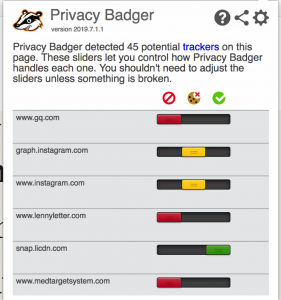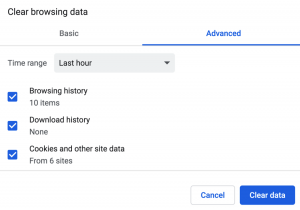Tracking
Smart devices, like all technologies, have many sides. From the users’ side, we think that smart devices are good because they make decisions on their own, needing less supervision and control from us. Want to phone someone? Just speak to your smartphone. It looks up the number and initiates the call, hands free. Woo hoo. Want to know if you need an umbrella today? Same deal.
There is, however, another side to smart devices: the apps’ side. Apps record and process each and every interaction. Order often from the same store or restaurant on your device? The app records those actions and uses that information to make the next order easier, faster. It might also offer a discount or BOGO based on your collected data. Watch a particular genre of movie or TV show on a smart TV? The same process occurs.
We create large and sophisticated files as we use our devices. Some apps sell the files to other apps and advertisers. Facebook not only tracks users’ activities while using Facebook, but continues to track users’ non-Facebook activities after they move on, and then buys their purchasing activity records from bricks and mortars stores. It combines the data to create a more complete profile of us to better target its ads. This allows it to offer advertisers very specific characteristics: e.g., divorced church-going men with shared child custody between the ages of 30 – 35 who take their golf clubs with them as they travel for work.
Recordings of our online activities are processed and used by the apps and websites we use and sold to companies and governments, then used without permission for purposes not disclosed.
Limiting Tracking
In many cases, the only way to avoid tracking is to avoid apps and devices. This is a difficult, sometimes impossible goad. There are, however, some strategies to reduce tracking.
DuckDuckGo is a non-tracking browser alternative.
Mozilla’s Firefox browser also blocks many trackers and provides more privacy.
Privacy Badger, from the Electronic Frontier Foundation, can be installed on browsers to show us which trackers are surveilling us and to allow us to block them.
Privacy settings can be adjusted on many apps and browsers. ‘Friends-only’ is an option that reduces the people who might access our posts, but does not prevent the app from tracking us.
Cookies
In the online world, ‘cookies’ refers to short algorithms that sites and apps place on our devices when we log in or activate them. Cookies serve many functions, some of which benefit the user experience. They can record our user preferences, so that each time start an app it appears and reacts the way we like it. They can record our identities, welcoming us by name when we visit and saving us the time and trouble of logging in.
For the apps, cookies can track our actions, so that they know how they might modify our user experience to make it more pleasant or easy. They also track us so that they can serve us ads that will be more likely to successfully sell us products and services. This is why we see ads for the shoes we were looking at yesterday on Amazon when searching for a weather forecast.
Families can reduce revealing their online activities by limiting or erasing their devices’ cookies at regular intervals.
Junk Drawers
npr.org
Many apps/sites request an email address as a condition of signing up. This is used as an identifier, but also to send us promotions. It can become very frustrating to wade through daily promotions from several sellers while looking for personal or business messages.
Families often have ‘junk drawers’ in their homes. These are places where they put random stuff that defies categorization: take-out menus, pens, fridge magnets, sewing kits, pet toys, etc. An electronic junk drawer can be created to receive and contain all the random email promotions. Create an email address that everyone agrees will be used when signing up for a new service or app. The promotions will go to this address and can be ignored—or accessed—at will.
pipedrive.com










